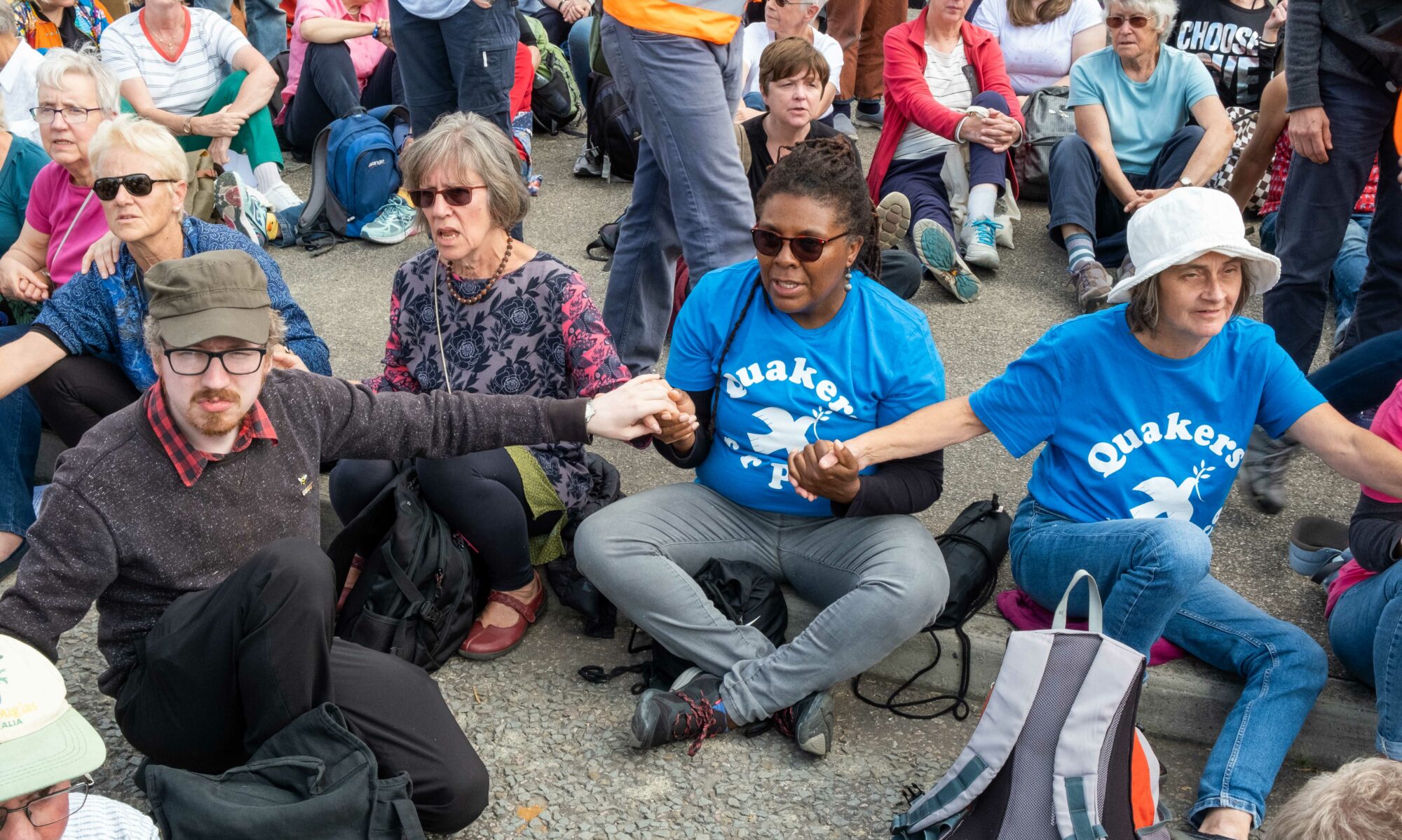An epistle from the Quaker Roots retreat, March 2024
Our Peace Is A Process
Recently a small group gathered at Huddersfield Local Meeting, for a weekend retreat, recognising our need to rediscover the spiritual roots of our peace testimony.
For a few days we tried to realise “the Republic of Heaven” here on earth, as best we could, with each person offering their gifts and energies, giving and receiving in friendship and community, “from each according to their abilities, to each according to their needs”, as Karl Marx so aptly put it. Grounded in a foundation of deep stillness and silence, we moved and meditated together, walked and worshipped, reflected and shared, spoke and sang, cooked and ate and talked together, embodying the peace we so long to see in our world.
At the start of the retreat we began by returning to the early roots of our Quaker Peace Testimony, grounding ourselves with the words of Margaret Fell, that reminded us that:
We are a people that follow after those things that make for peace, love and unity; it is our desire that others’ feet may walk in the same.
As a Quaker Roots community, we heard this reminder as a query. Are we clear enough in our knowledge of those things that make for peace, love and unity? Are we courageous enough in our following? We continue to sit with this query and are excited by the challenge to keep deepening our knowledge and growing our courage to follow.
One theme that emerged strongly throughout the retreat was the importance of community in our being able to follow after those things that make for peace, love and unity, especially community with those suffering first hand as a result of war, violent conflict and oppression. During one Meeting for Worship we heard this reading from the theologians Rita Nakashima Brock and Rebecca Ann Parker, from their book ‘Saving Paradise’:
Sustaining communities must be at the forefront of our work, and we must accept that we have power and responsibility to foster life in them. To be both powerful and responsible requires us to be committed to the sometimes difficult, sometimes joyful relationships of human communities. They are the only way we come to perceive and act upon the world for a greater good that both includes and transcends our individual existence. People with strong commitments to strong communities make them happen. They create the institutional structures that enable communities to endure the comings and goings of individual lives, failures in leadership, and the difficulties that are inevitable in life. Communities of ethical grace sustain relationships that require us to share responsibly, act generously towards one another, and resist oppressive and dominating forces that separate human beings from each other and deny our powers of love and friendship. They value the distinctive gifts of individuals for the good of the whole and require us to be open and vulnerable to the many complex dimensions of life that support the survival and thriving of life on earth, in all its diversity.
We recognise that there is much for us to learn here and much important work for us to do as we seek to move forward, but one clear lesson we have taken away from the retreat is the importance of regular, spacious gatherings, ideally in person, where we can slow down, centre down, and share in much deeper, more intimate ways, discerning ways forward together. We look forward to more retreats in the future, and also to exploring other ways of gathering together that grow faithfulness to our peace testimony.
Recognising the extremism of the arms trade in it’s ruthless and relentless drive for profit, we were also reminded of the importance of our own creative extremism for peace, love and unity, reading the following from Martin Luther King, Jr.’s ‘Letter From Birmingham Jail’, where he writes:
Though I was initially disappointed at being categorized as an extremist, as I continued to think about the matter I gradually gained a measure of satisfaction from the label. Was not Jesus an extremist for love: ‘Love your enemies, bless them that curse you, do good to them that hate you, and pray for them that despitefully use you, and persecute you.’ Was not Amos an extremist for justice: ‘Let justice roll down like waters and righteousness like an ever flowing stream’… So the question is not whether we will be extremists, but what kind of extremists we will be. Will we be extremists for hate or for love? Will we be extremists for the preservation of injustice or the extension of justice? … Perhaps the South, the nation and the world are in dire need of creative extremists.
We know that we have been called to be a community of creative extremists for peace, love and unity, and, in the face of so much violence and bloodshed globally, we feel deeply that we must continue in our peace testimony and work faithfully to find new and creative ways to do this in the years ahead, at DSEI and elsewhere.
We closed the retreat with a reading from Rex Ambler on the Peace Testimony, where he writes:
To testify truly we must be clear that peace is a process that begins with each of us giving attention to the leadings of our own hearts, and continues with a struggle with the deepest sources of violence in illusion and desire. This is as true in politics as it is in personal life. It is important then that we do not give the impression, even to ourselves, that peace can be attained by simply abstaining from certain violent actions. We testify, not to a moral principle that has to be adhered to in each and every situation, but to a process that can lead us into a different way of seeing the world and a different way of living in it. Our testimony should therefore take the form of exhibiting that process in our own lives and actions… It is a witness to what has happened, is happening, and can happen as people open themselves to the truth that is in them.
Those of us who gathered left inspired to keep on keeping on as we journey together in this never-ending process of peace, and we look forward to taking our next steps to deepen and grow this small but beautiful community of creative extremists, as we witness together for peace, love and unity in our often brutally violent world.
If you feel inspired to get more involved in our community, please do get in contact with us. We would love to hear from you!
In peace, love and unity,
Quaker Roots

